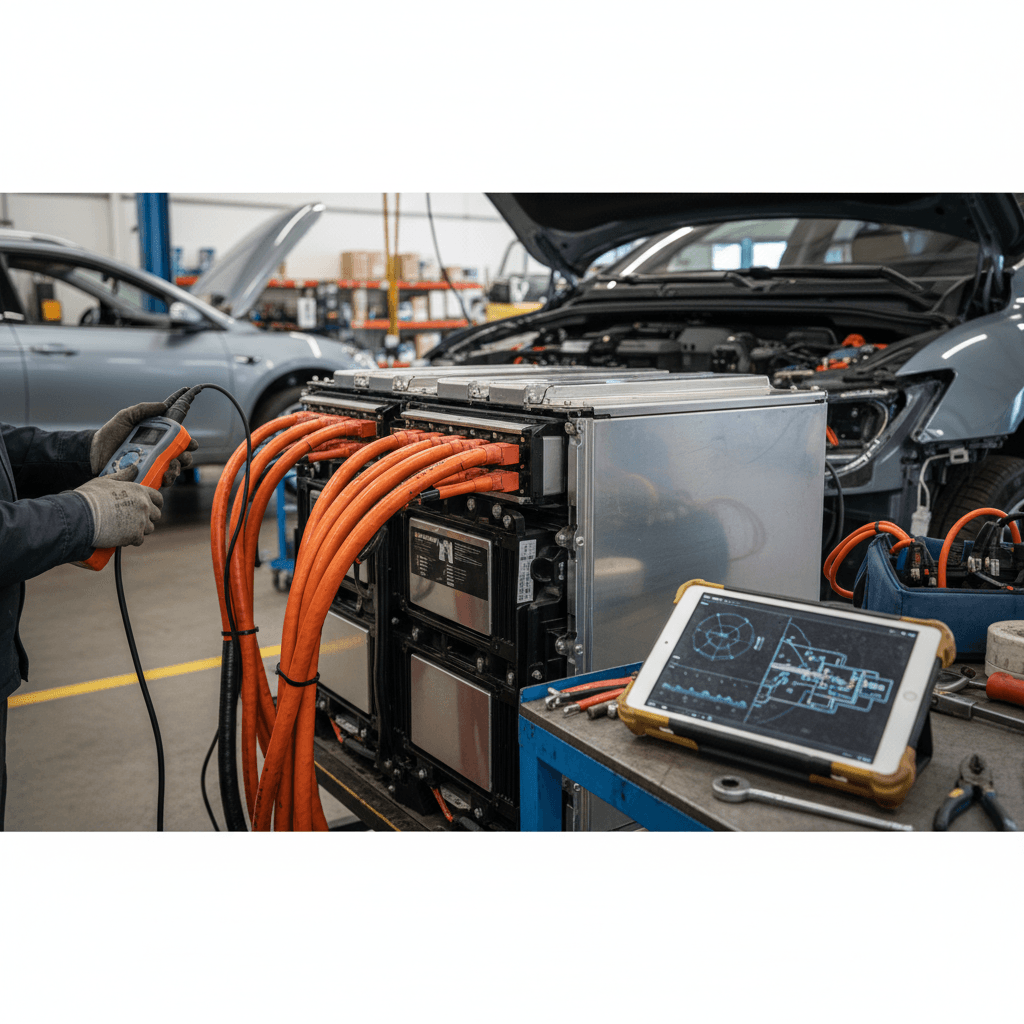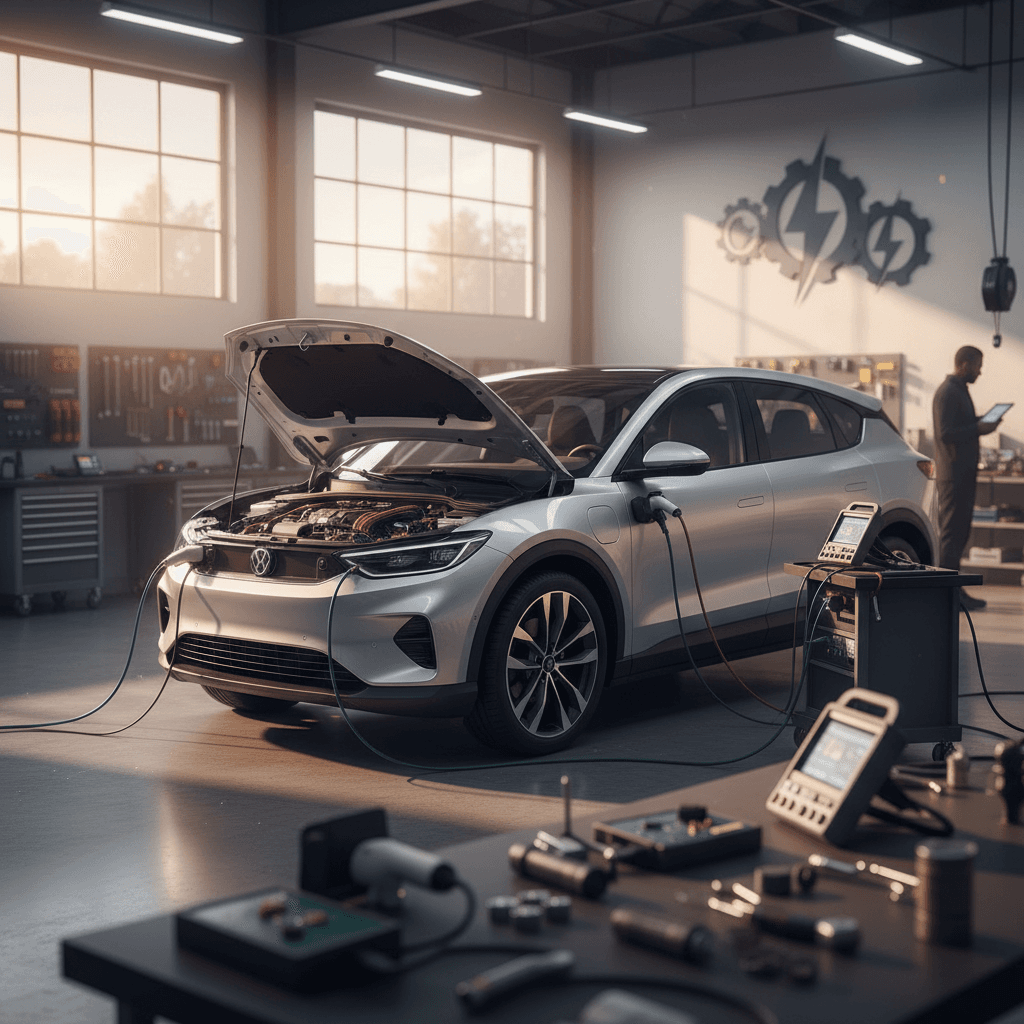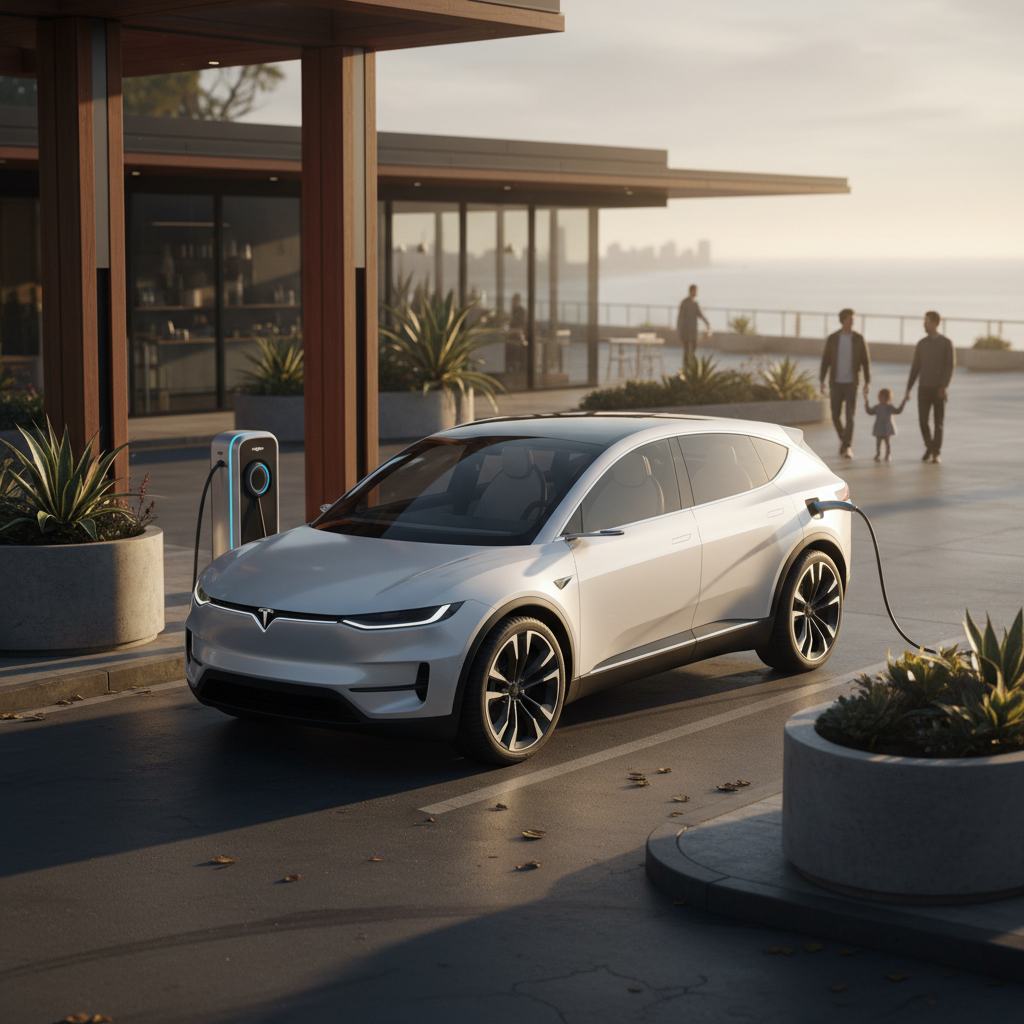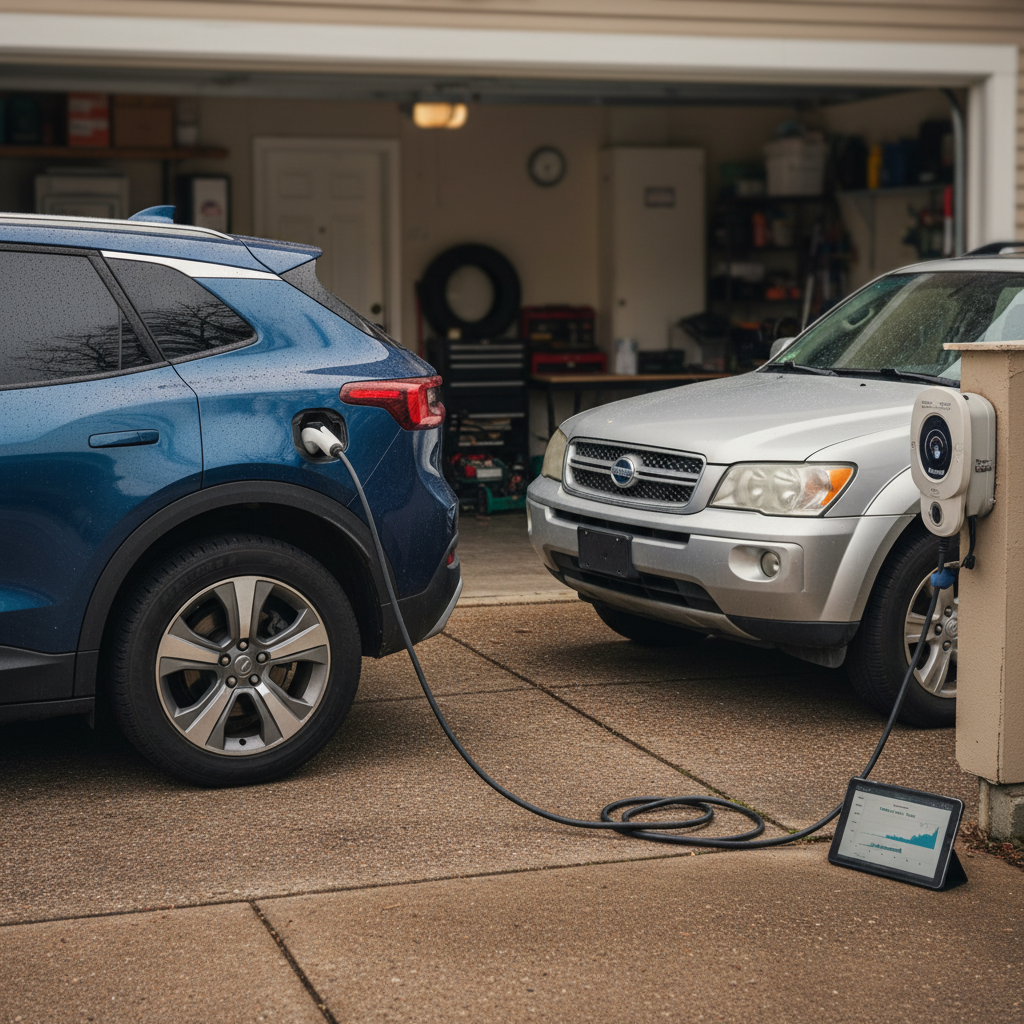You’ve searched for an electric vehicle mechanic near me because you want one thing: confidence. Whether you own a Tesla, Hyundai IONIQ 5, Ford F‑150 Lightning, or a used Nissan Leaf, you need to know who can safely handle high‑voltage systems, diagnose battery issues, and keep your EV on the road without dealership-level stress or pricing.
EV service is growing fast
Why finding an EV mechanic near you matters now
Electric vehicles are mechanically simpler than gas cars, but they’re not maintenance‑free, and when something does go wrong, the repair is more specialized. High‑voltage batteries, inverters, and charging systems require technicians trained to work safely around 400–800V systems. At the same time, EVs still need familiar services like tires, suspension work, cabin filters, and brake fluid.
EV ownership and service in 2025 at a glance
Why you can’t just use any mechanic
How EV maintenance really differs from gas cars
What your EV doesn’t need
- Oil changes or engine tune‑ups
- Spark plugs, fuel injectors, or timing belts
- Exhaust system repairs or emissions fixes
- Traditional multi‑gear transmissions and related service
For many owners, that means dramatically fewer line items, and surprises, on the service invoice.
What your EV still needs
- Tire rotations and replacements (often more frequently due to instant torque)
- Brake fluid changes and occasional brake service
- Suspension, steering, and alignment work
- Cabin air filters and HVAC service
- Battery, charging, and software diagnostics when warnings appear
The best EV mechanics blend traditional chassis know‑how with high‑voltage expertise and brand‑specific software tools.
Pro tip: schedule tires, not oil
Where to service your EV: dealer, chain, or independent shop?
Main options for EV service near you
Each has pros and cons, many owners use a mix of all three.
Franchise dealership
Best for: warranty work, recalls, complex software issues.
- Factory tools and technical support
- Technicians trained on your exact model
- Typically highest hourly labor rate
EV‑capable independent shop
Best for: out‑of‑warranty repairs and routine maintenance.
- Often lower labor rates
- More flexibility on parts sourcing
- Quality varies, vet training carefully
National service chains
Best for: tires, alignments, basic inspections.
- Growing EV training programs
- Convenient locations and hours
- Limited ability on deep battery or software issues
Good news for used EV buyers
How to find a qualified electric vehicle mechanic near you
Step‑by‑step: finding an EV mechanic you can trust
1. Start with EV‑specific directories and reviews
Search your city plus terms like <strong>“EV repair”</strong>, <strong>“electric vehicle mechanic”</strong>, or your model name. Filter reviews for EV mentions, not just general auto work.
2. Confirm EV training and certifications
Look for technicians with high‑voltage or OEM training (for example, brand‑specific EV courses) or recognized EV safety certificates. Don’t be shy about asking which courses they’ve taken.
3. Ask what models they see most often
Shops that routinely work on your brand, Tesla, GM, Ford, Hyundai, Kia, VW and others, will diagnose issues faster and are more likely to have the right scan tools on hand.
4. Verify high‑voltage safety procedures
A serious EV shop can explain how they de‑energize battery systems, lock out high‑voltage components, and protect technicians and your car during repair.
5. Check labor rate and EV diagnostics fees
EV‑specific diagnostics often cost more than a quick code scan on a gas car. Get clarity on hourly rates and what’s included before you book.
6. Test them with a simple service first
If possible, start with a tire rotation or brake inspection. You’ll see how the shop communicates, documents issues, and handles your EV before you trust them with major repairs.

Key questions to ask before you book EV service
- How many EVs do you work on in a typical week or month?
- Which EV brands and models do you see most often?
- What EV‑specific training or certifications do your technicians have?
- Do you have the tools to safely isolate and test my high‑voltage battery?
- Can you work with extended warranties or service contracts on EVs?
- How do you estimate EV repairs when battery or software issues are involved?
- Do you provide digital inspection reports with photos or video?
Use their answers as a litmus test
Typical electric vehicle repair and maintenance costs
What common EV services cost compared with gas vehicles
Actual prices vary by region, brand, and shop, but this gives a directional sense of what to expect when you call an EV mechanic near you.
| Service | Typical EV cost (US) | Notes |
|---|---|---|
| Tire rotation | $40–$80 | Your most frequent maintenance item; many owners rotate every 5,000–7,500 miles. |
| New tire set | $800–$1,400 | EVs often use heavier, low‑rolling‑resistance tires; prices vary by wheel size. |
| Brake fluid change | $120–$200 | Usually every 2–3 years, similar to gas cars. |
| Brake pad/rotor service | $300–$700 per axle | Less frequent thanks to regenerative braking, but corrosion or heavy driving can add cost. |
| HVAC cabin filter | $60–$150 | Often every 1–2 years; many shops bundle with other services. |
| High‑voltage system diagnostic | $150–$300 | Specialized tests and scan‑tool work when battery, charging, or inverter issues appear. |
| Battery coolant or thermal system service | $250–$600 | Intervals and complexity vary widely by brand. |
| On‑board charger or inverter replacement | $1,500–$4,000+ | Usually rare and often at least partially covered under component warranties. |
| Traction battery module repair or replacement | $4,000–$15,000+ | The big one, less common, but the main reason you want a shop that understands battery health. |
These are ballpark figures for a mainstream EV in 2025 at a non‑luxury shop or dealer.
Be cautious with “mystery” battery quotes
Battery health diagnostics and when to worry
Your high‑voltage battery is the most expensive component in your EV, and it’s also the piece shoppers and mechanics talk about most. Normal batteries lose a small amount of capacity each year, but serious degradation, rapid range loss, or charging failures point to problems that need a qualified EV mechanic.
- You’re losing range much faster than other owners of the same model.
- Fast‑charging speeds have dropped off dramatically without obvious causes like cold weather.
- You see repeated battery or high‑voltage warnings on the dash.
- The car refuses to DC fast‑charge at stations that work fine for other EVs.
- Range estimates swing wildly even on familiar routes.
What good battery diagnostics include

Used EVs: how service history and diagnostics protect you
If you’re shopping the booming used‑EV market, a good electric vehicle mechanic near you is part of your shopping toolkit, not just your emergency plan. Between faster depreciation, battery questions, and changing incentives, the used side is where many of the best EV deals live, if you can separate healthy cars from future headaches.
Before you buy: pre‑purchase EV inspection
- Full scan of powertrain, battery, and charging systems
- Verification of recall and software update history
- Inspection of tires, brakes, and suspension for EV‑specific wear
- Assessment of charging behavior (AC and DC fast‑charge if possible)
A pre‑purchase inspection from an EV‑trained shop, or a digital report like the Recharged Score, acts like an MRI before you commit.
After you buy: building a service relationship
- Move your EV’s service records to one trusted shop
- Schedule a baseline inspection within the first 30–60 days
- Ask the shop to flag any warranty‑eligible issues early
- Use their advice to plan future tires, brakes, and alignment work
The more your mechanic knows your EV’s history, the easier it is to spot small changes that point to big problems.
How Recharged fits into the picture
Electric vehicle mechanic near me: FAQ
Common questions about finding an EV mechanic
Bottom line: build an EV support team before you need them
Searching for an electric vehicle mechanic near me is a smart move to make before a warning light pops up or a road‑trip charging issue strands you. EVs tend to be cheaper to maintain than gas cars, but the stakes are higher when something goes wrong, especially around the battery and charging hardware. The right shop combines high‑voltage training, the correct tooling, and clear communication so you know what’s happening under the floorpan, not just under the hood.
If you’re already in a used EV, or thinking about buying one, pairing a trusted local EV mechanic with transparent data from solutions like the Recharged Score gives you the best of both worlds: objective battery health information and a real‑world technician who can act on it. Invest a little time now to find the right partner, and you’ll be able to enjoy quiet, low‑maintenance electric miles with a lot more confidence.



